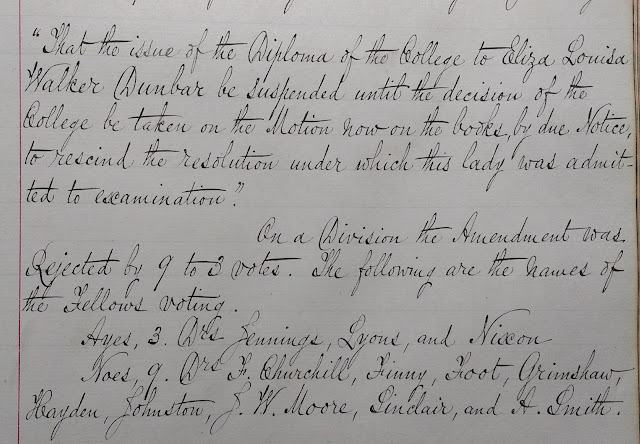The admission of Dr Eliza Dunbar
In December 1876 the British Medical Journal contained a short note from their correspondent in Ireland stating that ‘a female medical graduate (MD of Zurich) had obtained permission from the authorities of the College of Physicians to be examined for the Licence of Medicine of that College’. Her name was Eliza Dunbar, and the permission granted by RCPI marked the end of a decades long struggle for women to be allowed to practice as doctors in the British Isles.
 |
| Extract from BMJ, December 1876 (TPCK/7/4) |
Under the 1858 Medical Act only those holding qualifications from a specified list of British and Irish medical licencing bodies, could register and practice medicine in the British Isles. None of the organisations allowed women to take their examinations. By the 1870s several British women had obtained medical degrees from foreign universities, where women could study, but they were prevented by the Medical Act from becoming registered practitioner.
In 1876 the government bowed to mounting pressure and passed the Enabling Act. This Act permitted the medical licencing bodies to allow candidates with medical degrees from foreign universities to sit their examinations. It was because of the Enabling Act the Eliza Dunbar was able to sit the examination of RCPI for a Licence of Medicine.
On 9th January 1877 Eliza Dunbar, with four other candidates, took their clinical examination in the morning and sat the written paper in the afternoon. The following day the College’s examination committee meet and confirmed that Dunbar and two of the other candidates had passed. A last minute rear-guard action then took place, with a resolution put to the College to ‘rescind the resolution under which this lady was admitted to examination’, but it was defeated by 9 votes to 3. Dr Dunbar received her Licence, and RCPI became the first place to award a registrable medical qualification to a woman.
 |
| Extract from College Journal (RCPI/2/1/1/18) |
On 11th January Eliza Dunbar was examined viva voca for her Licence in Midwifery of the College, the minutes of the College noting that she was examined separately from the male candidates. Dr Dunbar passed this examination, and became the first women to receive the Licence in Midwifery from the College since Mrs Catherine Banford in January 1732.
Dr Sophie Jex-Blake, one of the leading campaigners for women to be allowed to practice medicine, received her Licence from the College in May 1877. She wrote in her published account of the campaign that the decision of RCPI to admit Eliza Dunbar was ‘the turning point in the whole struggle’. In a letter to this college she thanked them for the ‘kindness, justice and liberality’ shown in all their ‘relations to the women who have made medicine their profession’.
 |
| Dr Sophia Jex-Blake |